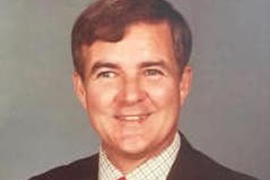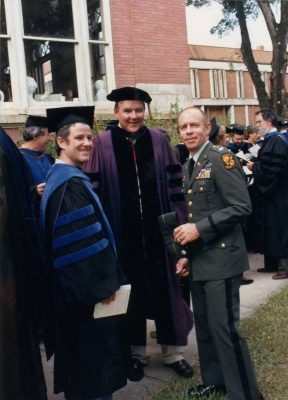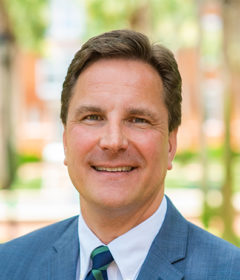Kevin O’Keefe Was ‘Perfect Model’ of a Stetson Professor


Kevin O’Keefe received the highest award for teaching at Stetson University and was the “perfect model” of a professor, dedicated to his work, his students and service to the college.
O’Keefe, a Stetson history professor for 33 years, passed away March 29 in Concord, Massachusetts, due to Parkinson’s disease. He was 75.
“Kevin has always been, in my mind, a perfect model of what a Stetson professor should be,” said Kimberly Reiter, Ph.D., an associate professor and former colleague in the History Department. “Teacher, scholar and service to his school were high up in his commitments. Maybe today, he would be considered old-fashioned.”
O’Keefe’s younger sister, Patricia O’Keefe Curran, who lives near Concord, said her brother loved working at Stetson.
“It was very important to him. Even at the end of his life, he would speak of Stetson. He would often talk about things to do with the university. It was his life. He loved the camaraderie. He loved the campus. He was a happy man there,” she said.
Born in New York City, O’Keefe received a Bachelor of Art from Queens College (CUNY) and earned his Ph.D. in History from New York University. He attained commission as a U.S Naval officer, served in the Caribbean during the Cuban Missile Crisis and later in the Mediterranean Sea aboard the U.S.S. Franklin Delano Roosevelt aircraft carrier.

He started teaching at Stetson in 1975, and his sister found his letter to the dean of Stetson’s College of Arts and Sciences announcing his plans to “retire fully for health reason in May 2008.”
He received Stetson’s McEniry Award for Excellence in Teaching in 1986, chaired the History Department and the Faculty Senate, and became Professor Emeritus after his retirement. He wrote the book, “A Thousand Deadlines; The New York City Press and American Neutrality 1914-1917,” and taught American diplomatic and military history.
“We all knew him as this great professor and friend,” said history Professor Eric Kurlander, Ph.D. “He was the quintessential professor, with a tweed jacket, and he related to each generation of students regardless of gender or ethnicity.”
Added Grady Ballenger, an English professor and then-Dean of the College of Arts and Sciences when O’Keefe retired: “University sports teams these days call themselves ‘nations;’ Kevin lived the older image: It was all about family, his own and the family of his fellow teachers and students. He was an incomparably decent man — and even his humor, which I loved, had no aim other than joy in our shared humanity.”
His sister said O’Keefe cared for their ailing mother in the later years of her life, moving her into his home in Yorkfield Square in DeLand, instead of a nursing home. Her death in 2000 coincided with a worsening of his symptoms. He began to see a neurologist in 2004, the year that he began to suffer tremors. He was diagnosed with Parkinson’s disease in 2006 and the tremors made it increasingly difficult to write, even on the board in his classrooms, she said.
Parkinson’s disease is a chronic, degenerative neurological disorder that results from the loss of cells in various parts of the brain, resulting in less of the dopamine that is needed for neurons to fire, according to the Michael J. Fox Foundation website. Patients increasingly cannot control their movements. The cause is unknown, although research points to genetic and environmental factors, according to the website.
After O’Keefe retired from Stetson, he lived in DeLand until 2013, when the toll of Parkinson’s disease became so severe that he moved to Massachusetts to live near his sister. A lifelong lover of libraries, he donated 4,000 books to the DeLand public library when he moved north.
O’Keefe requested his body be donated for Parkinson’s research, according to his obituary. In lieu of flowers, Curran asked that donations be made to the Parkinson’s disease foundations that he supported and that helped him – the National Parkinson Foundation and the Michael J. Fox Foundation – or to a local library.



